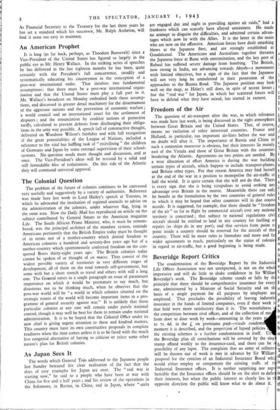Freedom of the Air
The question of air-transport after the war, to which reference was made here last week, is being discussed in the right atmosphere between Great Britain and the United States. That, of course, means no exclusion of other interested countries. France and Holland, in particular, ran important air-lines before the war and no doubt will after it. The importance of Russia and China in such a connexion moreover is obvious, but their interests lie mainly east of the Vistula and those of Great Britain with the countries bordering the Atlantic. Agreements on two points are needed. By a wise allocation of effort America is during the war building certain types of aircraft, which happen to include transport-planes, and Britain other types. For that reason America may find herself at the end of the war in a position to monopolise the air-traffic of half the world. It is quite certain that she will not do that. There is every sign that •she is being scrupulous to avoid seeking any advantage over Britain in the matter. Meanwhile there can only be benefit in the formulation by the two countries of general rules to which it may be hoped that other countries will in due course accede. It is suggested, for example, that there should be "freedom of the air" so far as flight by commercial aircraft over any national territory is concerned ; that subject to national regulations civil aircraft should be entitled to land in any country for fuelling or repairs (as ships do in any port); and that services from point to point inside a country should be reserved for the aircraft of tha country. There will be more rules to formulate and more and f wider agreements to reach, particularly on the status of colonic in regard to air-traffic, but a good beginning is being made.






















 Previous page
Previous page